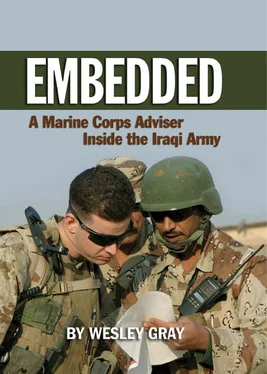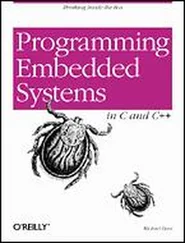If the mortars reminded me that I was in Iraq, touring Saddam Hussein’s Al Faw Palace reminded me of the injustice during Saddam’s rein. The palace is stunning and truly ostentatious. Imagine one of the Arab palaces in the Disney movie Aladdin . Now put a lake around the palace and fill it with exotic fish species, tended to at all times by a small army of immigrant labor. Next add fifty acres of personal hunting grounds, stocked with nonnative exotic wildlife shipped in from all corners of the globe. Finally add on a few satellite palaces for all of your sons and some additional “recreational” palaces to house your indoor swimming pools. This is the basic setup for Al Faw Palace.
The inside of the sixty-two bedroom, twenty-nine bathroom palace is even more stunning. As you approach the palace there is an elaborate thirty-foot front door made of the most precious metals and woods on earth. Once you enter the palace door, a crystal chandelier the size of a Honda Civic hovers above your head. If you move another twenty feet inside the palace, on your right you will see a gold-plated emperor’s throne Yasser Arafat gave Saddam as a gift (see photo 1). In addition the entire interior of the palace, save the thrones and chandeliers, which are made of gold, crystal, and other precious materials, is made of hand-carved marble stones. There is even a bathroom made of pure gold inside the palace. I must admit oil-rich dictators who have a knack for stealing from the United Nations’ Oil for Food program really know how to live.
The next day we took a sixty-mile flight from Camp Victory to Camp Taji, which is twenty miles north of Baghdad. We didn’t exactly travel in style. We managed to stuff around twenty bags of equipment and six passengers into the Black Hawk helicopter, maxing out the payload in the process.
The helicopter flight over Baghdad was exhilarating. The entire time I felt as though I was an action hero in a movie. The Black Hawk pilots fly anywhere from one hundred to three hundred meters off the deck at around two hundred miles per hour. The purpose of flying at low altitude and high speeds is to make it difficult for insurgents to attack the aircraft. Of course, the speed is nice for dodging dangers on the ground, but when you have the Black Hawk filled to the brim with twenty bags and half your body is hanging outside the helicopter, the hairs on your neck start to stand on end.
The sights of Baghdad fascinated me. The views made me forget the danger. The Baghdad area is stunning when you put aside the daily car bombs and bristly people. Our path followed the Euphrates River, which slices straight through the heart of the city. I have never seen such lush green vegetation and palm trees in my life. This is saying something, considering I have lived in Hawaii.
From the air the disparity between rich and poor is illuminated. Certain homes in Baghdad are truly royal, complete with gargantuan private swimming pools, Euphrates riverfront views, mansion-sized dimensions, amazing architecture, lush gardens, and extravagant landscaping. Meanwhile only half a mile farther along the Euphrates, people live in extreme poverty. The slum areas of Baghdad make the nastiest parts of South Side Chicago or West Philadelphia look like a Beverly Hills gated community: trash is everywhere, sewage is flowing through the streets, people are muddling about, scrap metal collection piles are on the corners of the roads, and feral animals run rampant.
Despite the drastic differences in circumstances throughout Baghdad, there is one equalizing feature for all inhabitants in the area—the mighty Euphrates River. It is the region’s lifeblood. From above Baghdad it looks as though God decided to put an aorta in the center of the city. I had never realized how important water is to this region of the world: without water in this region, there is no civilization.
The helicopter crew chief yelled in our direction, breaking my gaze on the landscape. “Gents, the bird is landing in five minutes. Prepare your gear.” SSgt. Jonathan Chesnutt (“Nuts”) yelled, “Camp Taji, here… we… come. Yeehaw!”
Chapter 3
Preparing for Combat Adviser Duty
July–Early August 2006
We settled into Camp Taji, where we would live and train for the next few days. The camp is a joint base, one section designated for Americans and one section designated for the Iraqi army. The American side of camp is gigantic, with all of the over-the-top amenities found at Camp Victory. The base is another shining example of the U.S. Army’s finer attempts at fortifying the hell out of a piece of earth.
Unfortunately, there were no fancy amenities for us; we would be living on the IA side of Camp Taji. The IA side of the camp was more spartan, but despite its lack of comforts, it had a huge advantage: we were immersed in Iraqi culture and language. Alas, a coin has two sides. A negative of the IA camp was that the U.S. Army ran the show because of the IA’s incompetence. Usually, the U.S. Army is a decent outfit and the Marines get along nicely with them; however, this time things were different. The Army had decided to put a manly female first sergeant, nicknamed the “Behemoth,” in charge of the IA camp. We had to follow the Behemoth’s rules at all times.
The Behemoth introduced herself then ranted, “Let me put a few things up front to you gentlemen. This is my camp and you will follow my rules.” She paused and started on her laundry list of rules. “My first rule is that you must be in full PT [physical training] gear, to include tennis shoes, and have your weapon with you when traveling to the heads.” Our team’s Navy corpsman, James “Doc” McGinnis, protested. “Are you telling me I have to wear my tennis shoes to the shower and bring my weapon? That would imply that I have to walk over to the shower in my tennis shoes, take my tennis shoes off, put my shower shoes on, get out of the shower, put my soggy feet into my tennis shoes, and then travel back to the barracks—and the barracks are thirty feet away! And to compound things, you want me to somehow watch my weapon while I’m cleaning my balls and have soap in my eyes?” Everyone on the MiTT laughed. The Behemoth replied defiantly, “Yes, exactly. Have a nice day gentlemen.” She squeezed her large rear through the door to our barracks and exited the room. That woman was scary.
After our encounter with the Behemoth, I put on my full PT gear—with tennis shoes—and scurried to the restroom. As I entered the head I saw a janitor. He greeted me in flawless English. “Hello, how are you doing today?” Figuring I had an Iraqi who was fluent in both English and Arabic, I attempted to ask him some questions. I rattled off Arabic phrases for a good thirty seconds, caught my breath, and waited for a response. Confused, the man again said, “Hello, how are you doing today?”
Perplexed, I spent another minute trying to engage the janitor. He was as interactive as a pet rock. Finally he responded with something I could understand: “I Filipino.” I realized I was not dealing with an Iraqi at all. I was dealing with a Filipino laborer who did not understand Arabic or English. He only knew one line in English and he knew it well. Phew, I had been worried my Arabic was no good.
We killed time watching back-to-back episodes of the TV series 24 for a couple days until finally the U.S. Army’s Camp Taji Military Adviser Course started. Major Gill, a supermotivated U.S. Army officer, taught our first class on the ins and outs of the PRC-148 radio, a personal hand-held radio with which we would communicate. Our next class, on how to operate a personal locator beacon (PLB), a device that sends signals to friendly forces if activated, was terrible.
Читать дальше












